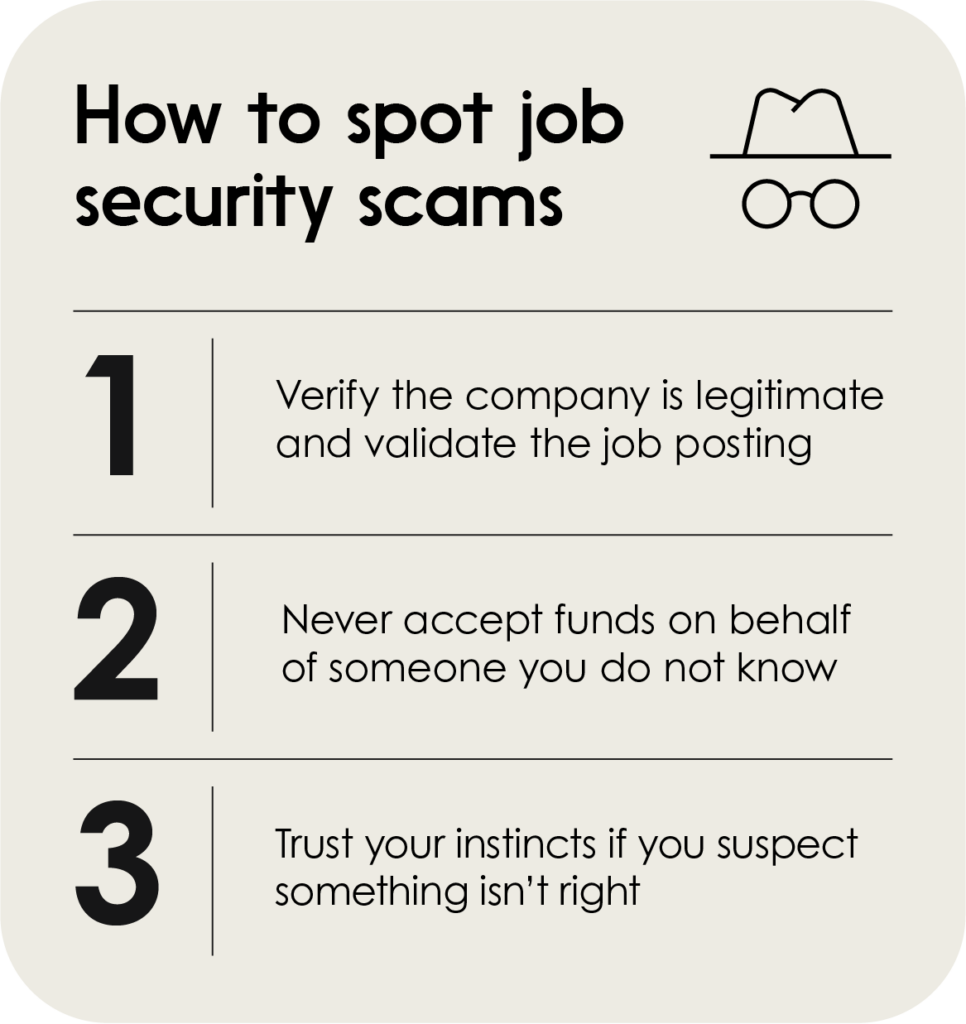Canadians are increasingly turning to “work from home” ads offering quick and easy ways to earn money.
The problem? Criminals take advantage of job-seekers, including postsecondary students and newcomers to Canada, with fraudulent offers and schemes that trick their targets into taking part in criminal activity.
To help you navigate around the pitfalls, we’ve rounded up some information that will help you be prepared to recognize and avoid job scams.
How to spot a job scam
Job scams involve fraudulent offers of employment, advertised through job search websites, classified ads, and direct messages via email or text.
You may be the target of a job scam if your new or prospective employer requests that you, as the employee, deposit payments into your bank account and then send the funds onward to someone else. The payments are likely the proceeds of crime, and you’re being used as a “money mule” to move the funds between accounts.
A similar scheme involves the fraudster sending the target a counterfeit cheque, making up a story about why they need the employee to cash it and send back some of the funds.
Fraudsters may also demand money for training, uniforms or other things the employee would need in order to do the (fictional) job. There actually is no job, and the fraudster will simply keep the money and end contact with the target after they’ve received the money.
Variations on job scams
According to the Canadian Anti-Fraud Centre, here are some scenarios fraudsters have used to target people living in Canada:
- Car wrapping: Scammers offer to pay you for wrapping your vehicle with a company logo or ad. You’re sent a cheque. You’re instructed to deposit it and then withdraw some of the funds and send them to a certain account to pay for costs relating to the wrapping/decal. It’s then that you learn the cheque was counterfeit and you’re responsible for the lost funds.
- Other counterfeit cheque scams: Fraudsters have targeted people with other fake jobs and opportunities as a ruse to get them to deposit a counterfeit cheque and forward money to a certain account. These jobs include caregiver, administrative assistant, data entry clerk and mystery shopper.
- “Financial agent” schemes: Criminal organizations hire people to receive client payments on behalf of a company (which is affiliated with the criminals), and then forward the money in the form of cryptocurrency to another party. This is an example of criminals using people as money mules.
How to protect yourself from job scams

The security tips below will help you protect yourself.
1. Verify the company is legitimate and validate the job posting
2. Never accept funds on behalf of someone you don’t know. This could be money laundering.
3. Trust your instincts if you suspect something isn’t right.
And remember: A legitimate employer will not ask you to pay them. Nor will they ask you to accept money and then send it to someone else.
What should you do if you believe you’re the target of a job scam?
Whenever you think you may be a target for a scam, Interac advises taking the “Three S approach.” That means: Stop before acting on an unusual message or request. Scrutinize the situation carefully. And Speak up if you have been targeted by reporting it to the Canadian Anti-Fraud Centre. You can learn more about the Three S approach here.
Learn more about spotting scams in Canada
Postsecondary students and new Canadians are especially susceptible to being targeted by fraudsters. If you belong to one or both of these groups, it’s a great idea to be prepared by knowing about common fraud types before you encounter them. Here, you can learn about how to spot other types of scams that target newcomers to Canada. And in this article we highlight fraud types that have been aimed at college and university students, particularly international students.
Want to protect yourself from scams that target all Canadians? Know how to spot other trending forms of fraud.



